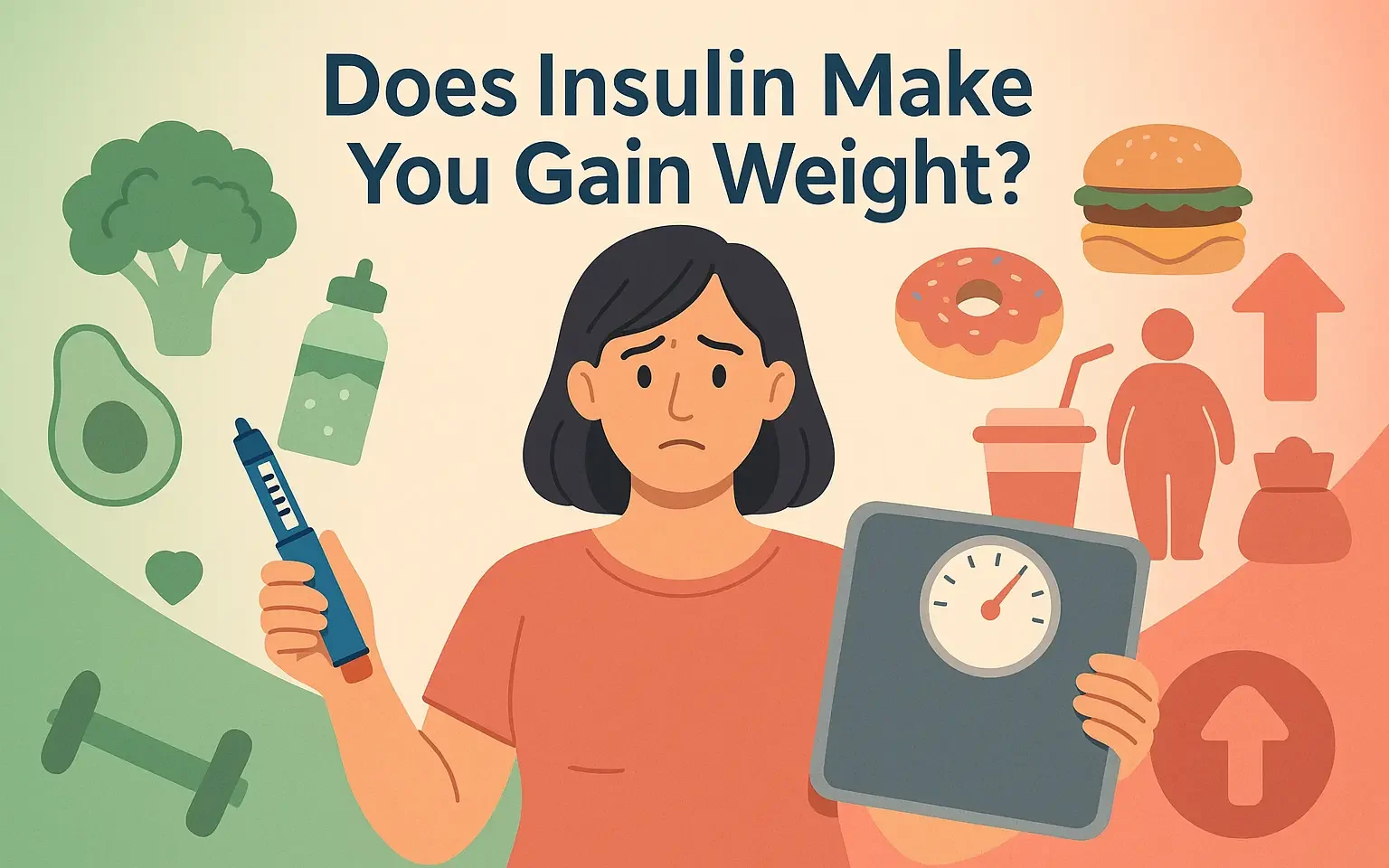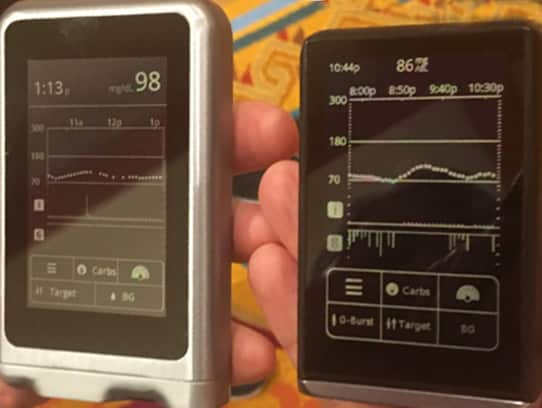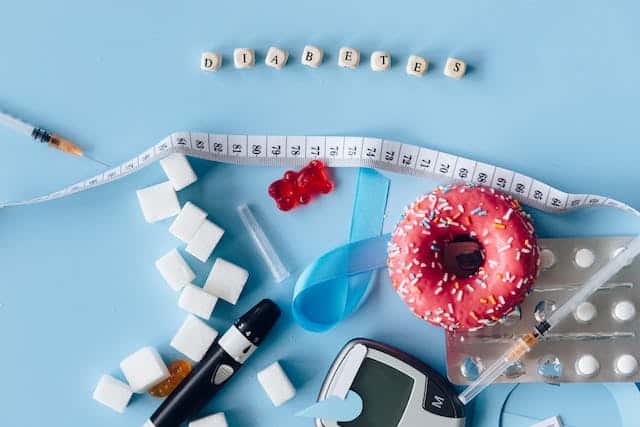Does Insulin Make You Gain Weight? Let’s Clear the Confusion
Does insulin make you gain weight? It is a question many people with diabetes ask when they first begin insulin therapy. The short answer is that insulin can contribute to weight gain, but it does not have to be inevitable. By understanding how insulin works in your body and adopting practical strategies, you can keep your weight under control while managing your blood sugar.
Understand Why Insulin Affects Weight
Insulin is a hormone responsible for helping your cells absorb glucose (sugar) from the bloodstream to produce energy. If your body does not produce enough insulin or becomes resistant to it, you might need insulin injections to lower your blood sugar. However, insulin can also encourage your body to store excess sugar as fat when you consume more calories than you need.
How Insulin Works In Your Body
- Insulin allows sugar from your meals to enter cells.
- If you eat more food than your body can use, the extra sugar ends up getting stored as fat.
- Over time, this can translate into added pounds on the scale.
Research shows that people on insulin therapy can gain anywhere from 1.78 kg to as much as 9 kg during the first year of treatment, though not everyone gains weight at the same rate (Obesity Medicine Association, Diabetes Obesity Metabolism). Learning how to fine-tune your lifestyle alongside insulin use can help minimize these effects.
Identify Key Factors Of Weight Gain
Several factors make you more prone to weight gain when taking insulin. From your dosage requirements to lifestyle habits, being aware of these issues helps you create a plan that meets your needs.

Insulin Dosage And Baseline Health
Higher doses of insulin can increase your chances of putting on extra weight, especially if you start insulin therapy with elevated blood sugar levels. According to a study of 2,179 participants, those with a higher baseline A1C and lower baseline BMI were more likely to experience significant weight gain (Obesity Medicine Association).
Defensive Snacking
You might overeat when worried about low blood sugar, a habit sometimes called “defensive snacking.” If you fear hypoglycemia, you could reach for snacks more often than necessary, adding extra calories that your body does not actually need.
Insulin Resistance
If your insulin resistance is high, your body has to work harder to use insulin effectively. Some people find that insulin resistance can lead to even more weight gain. For a deeper look into this connection, you can explore does insulin resistance cause weight gain.
Use Effective Strategies For Balance
Preventing insulin-related weight gain largely comes down to making mindful choices around what you eat, how much you move, and how you monitor your blood sugar.
Focus On Balanced Meals
- Control portion sizes and aim for a balanced plate (half nonstarchy vegetables, one-quarter protein, and one-quarter starch).
- Choose water or zero-calorie drinks instead of sugary beverages.
- Avoid the temptation for second helpings.
According to the Mayo Clinic, swapping high-calorie drinks for water is a simple trick that helps you skip unnecessary calories.
Stay Physically Active
Regular physical activity helps your body use insulin more efficiently. Most adults benefit from at least 150 minutes of moderate aerobic exercise (like brisk walking, biking, or swimming) each week, plus muscle-strengthening exercises at least twice weekly (source). Remember to check your blood sugar before and after exercise. If it tends to drop, adjusting your insulin dose or having a small snack may help prevent hypoglycemia.
Monitor Blood Sugar Levels
Keeping an eye on your glucose readings helps you recognize patterns that might lead to weight gain. If you notice more lows, talk to your healthcare provider about adjusting your insulin dosage to reduce the temptation for defensive snacking.
Explore Different Insulin Formulations
Not all insulin is the same. Some newer basal insulin analogs, like insulin detemir (Levemir), have been associated with less weight gain when compared to certain conventional human insulin preparations (Obesity Medicine Association). Ask your healthcare provider if a different insulin type could be right for you.
Speak With Your Healthcare Team
Managing diabetes can feel like juggling several priorities at once, so it pays to work closely with your doctor or diabetes educator. They can:
- Adjust your insulin doses for optimal blood sugar management.
- Suggest meal plans that align with your weight and health goals.
- Recommend strategies to address insulin resistance or discuss the average weight gain while on insulin.
- Provide guidance about medications like metformin that sometimes offset insulin-related weight gain.
If hypoglycemia is a recurring concern, your healthcare team can also give you tips on preventing and treating low blood sugar safely without overcompensating with extra snacks.
Key Takeaways
- Yes, insulin can make you gain weight if you consume more calories than your body needs.
- Maintaining a balanced diet, watching your portions, and focusing on low-calorie drinks can limit unnecessary calorie intake.
- Staying active helps your cells use insulin more effectively while burning off extra calories.
- Talk to your healthcare provider about the type and dose of insulin you use. Some formulations carry a lower risk of added pounds.
- Above all, monitoring your blood sugar regularly and communicating changes to your healthcare team will keep you on track.
Does insulin make you gain weight? It can, but you can avoid unwanted pounds by staying active, mindfully watching what you eat, and working with your healthcare team on a treatment plan that supports both your blood sugar and your waistline. By taking a proactive approach, you will feel more confident managing your diabetes while keeping your weight in check.








Leave a Reply